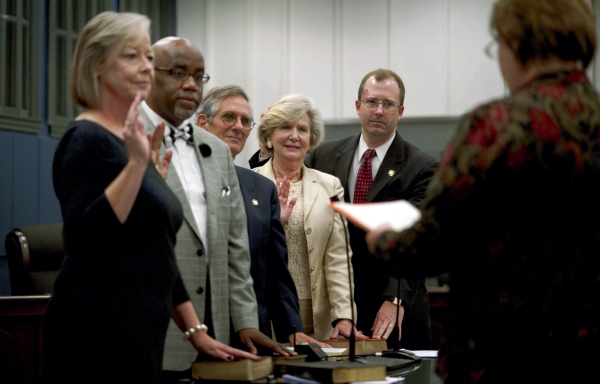My Turn, Kenneth Stutts: Be careful with Salisbury City Council changes
Published 9:12 pm Saturday, November 25, 2017

- City Clerk Myra Heard, right, administers the oath of office to Salisbury's City Council in 2015, which then included, from left, Maggie Blackwell, Kenny Hardin, David Post, Karen Alexander and Brian Miller. Jon C. Lakey/Salisbury Post
I want to thank Councilman David Post for repeating the call for an elected mayor position and voting wards for our city. Many others have brought this issue up over the years, but with no success. With Councilman Post’s long work history in Washington before returning to Salisbury, I hope his piece inspires more readers to consider this forgotten issue. While many will pick and choose from my words in order to generalize my opinion as opposition, it is not. I merely seek to advocate more careful consideration of the issue.
The mayor is the first among equals. The mayor is chosen by her or his fellow council members to be the leading face of our city, while at the same time working with them to ensure problems bought to a council member’s attention are meaningfully addressed. Some mayors have understood their role and actively included their peers in the process. Some mayors have not.
The mayor also serves at the pleasure of the council. This means if the mayor fails to fulfill her or his duty to the people of this city as a whole, the council can (and should) choose a new person for that role. An elected mayor would not be subject to this type of checks and balances.
Concerning the implementation of a ward system, there are many important issues to consider. How do we draw the ward districts? What factors should be taken into account? Do we construct the districts based on historic neighborhoods, race, age ranges or household income?
Many seemingly objective criteria are in fact not objective. This is an easily abused system.
Given the recent history of gerrymandering at the state level (Salisbury itself is currently gerrymandered using the cracking method), I naturally become wary when anyone starts talking about drawing districts.
Presently, we elect five people from the city as a whole. In order to be successful, candidates must appeal to a wide variety of people and groups across the city and cannot rely on single voting blocks to win their seats. This causes candidates to consider issues and concerns they may otherwise not have. Successful candidates take that knowledge of cross-city issues and concerns and bring it to the council.
The ward system would lessen the voice of smaller voting blocks. Instead of campaigning on citywide issues, ward candidates would limit their concerns to those of these artificially constructed wards. Citywide elections also allow the people to choose from a wide array of individuals that most closely champion their issues and concerns, not just individuals in their wards.
One of the main reasons cited for a change to a ward system is the disconnect between the number of African-Americans that call Salisbury home and their representation on the city council. It is a sad truth in our city that African-Americans do not turn out to vote in numbers that are proportional to their population in the city as a whole.
African-American representation on the city council is a civic engagement/voting issue which will not be remedied by instituting a ward system with ostensibly guaranteed positions. This would only serve to stoke the prejudicial opinions of other groups in our city and weaken the political clout of any candidates elected from these wards.
I also dispute the implied assertion that any imposed demographic category votes as a block, especially at a local level. Such labels give probabilities, not absolutes.
Finally, while this is an important issue, the people of Salisbury also have other issues with greater priority: restoring the trust of residents in their city government, encouraging more citizen participation in our city government, the state of our city schools, the prevalence of crime, the transparency of city actions, better jobs with actual living wages, and many more.
Change is hard in our city. We are also lucky in this town. We have elected five individuals with the ability to lead this city to greatness by building a stronger Salisbury. I personally look forward to the Salisbury City Council addressing these priority issues in a meaningful manner under the leadership of Mayor-elect Heggins and Mayor Pro Tem-elect Post.
Kenneth Stutts lives in Salisbury.

